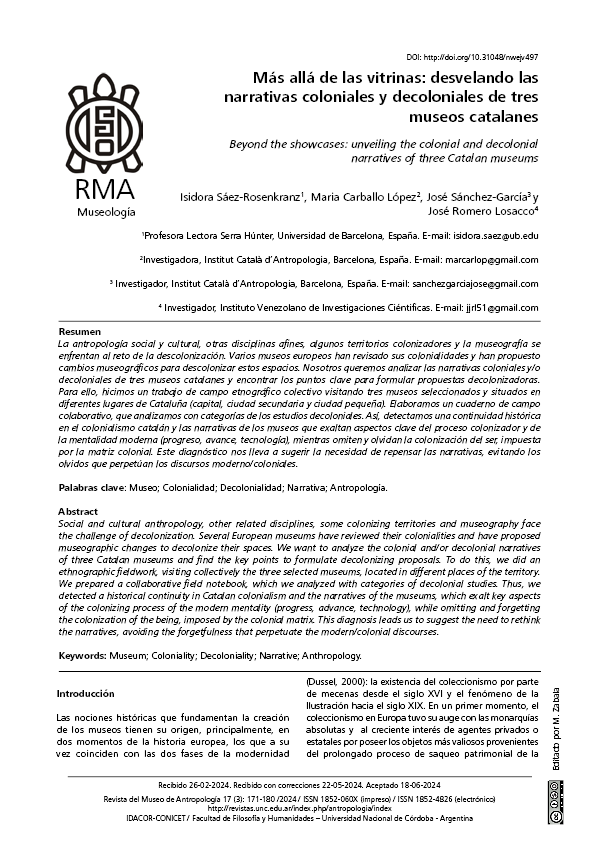Beyond the showcases: unveiling the colonial and decolonial narratives of three Catalan museums
DOI:
https://doi.org/10.31048/nwejv497Keywords:
Museum, Coloniality, Decoloniality, Narrative, AnthropologyAbstract
Social and cultural anthropology, other related disciplines, some colonizing territories and museography face the challenge of decolonization. Several European museums have reviewed their colonialities and have proposed museographic changes to decolonize their spaces. We want to analyze the colonial and/or decolonial narratives of three Catalan museums and find the key points to formulate decolonizing proposals. To do this, we did an ethnographic fieldwork, visiting collectively the three selected museums, located in different places of the territory. We prepared a collaborative field notebook, which we analyzed with categories of decolonial studies. Thus, we detected a historical continuity in Catalan colonialism and the narratives of the museums, which exalt key aspects of the colonizing process of the modern mentality (progress, advance, technology), while omitting and forgetting the colonization of the being, imposed by the colonial matrix. This diagnosis leads us to suggest the need to rethink the narratives, avoiding the forgetfulness that perpetuate the modern/colonial discourses.
Downloads
References
Ariese-Vandemeulebroucke, C. E., y Wróblewska, M. (2022). Practicing decoloniality in museums: A guide with global examples. Amsterdam University Press. https://doi.org/10.5117/9789463726962
Bergeron, Y., y Rivet, M. (2021). Introducción. Descolonizar la museología o “reformular la museología”. ICOFOM Study Series, 49(2), 44–57. https://doi.org/10.4000/iss.3508
Brown, K., González Rueda, A. S., y Brulon Soares, B. (Eds.). (2022). Decolonising Museology. ICOM/ICOFOM.
Cazzato, L. (2016). Mediterranean: Coloniality, Migration and Decolonial Practices. Politics. Journal of Political Studies, 5, 1–17. https://doi.org/10.6093/2279-7629/3978
Chagas, M., Assunção, P., y Glas, T. (2014). Museologia social em movimento. Revista Cadernos do Ceom, 27(41), 429-436.
Chambers, I. (2004). The Mediterranean: A postcolonial sea. Third Text, 18(5), 423–433. https://doi.org/10.1080/0952882042000251769
Dalla-Corte Caballero, G. (2012). Barcelona y América: Una relación cultural y económica para ganar el mundo. En M. Rodrigo y Alharilla (Ed.), Les bases colonials de Barcelona, 1765-1968 (pp. 19–27). Ajuntament de Barcelona.
Dussel, E. (2000). Europa, modernidad y eurocentrismo. En E. Lander (Ed.), La Colonialidad del Saber: Eurocentrismo y Ciencias Sociales. Perspectivas Latinoamericanas (pp. 41–53). CLACSO.
Gilroy, P. (2016). Europe Otherwise. En S. Ponzanesi y G. Colpani (Eds.), Postcolonial transtitions in Europe: Contexts, Practices and Politics (p. XI–XXV). Rowman & Littlefield.
Hernández, F. (1992). Evolución del concepto de museo. Revista general de información y documentación, 2(1), 85–98.
Lugones, M. (2008). Colonialidad y Género. Tabula Rasa, 9, 73–101.
Macpherson, C. B. (2005). La teoría política del individualismo posesivo. De Hobbes a Locke. Trotta.
Mignolo, W. (2007). La idea de América Latina. La herida colonial y la opción decolonial. Gedisa.
Parada, N. (2008). De lo sagrado a lo arqueologizado. Decolonizando el Museo Nacional de Colombia. Buenos Aires, Clacso.
Piqueras Arenas, J. A. (2021). Negreros: Españoles en el tráfico y en los capitales esclavistas. Catarata.
Quijano, A. (1992). Colonialidad y modernidad/racionalidad. Perú Indígena, 13(29), 11–20.
Quijano, A. (1998). Colonialidad del poder, cultura y conocimiento en América Latina. Ecuador Debate, 44, 227–238.
Quijano, A. (2014). Colonialidad del poder, eurocentrismo y América Latina. En Cuestiones y horizontes de la dependencia histórico estructural de la colonialidad/descolonialidad del poder (pp. 777–832). CLACSO.
Rodrigo, M. (2012). Barcelona i el món americà. En M. Rodrigo y Alharilla (Ed.), Les bases colonials de Barcelona, 1765-1968 (pp. 9–17). Ajuntament de Barcelona.
Rodrigo y Alharilla, M. (Ed.). (2012). Les bases colonials de Barcelona, 1765-1968. Ajuntament de Barcelona.
Solà, À. (1993). Características de la burguesía barcelonesa del siglo XIX. Notas historiográficas y apuntes de contenido. Cahiers de la Méditerranée, 46–47, 41–51.
Solà i Parera, À. (2001). Os americanos catalans e o seu impacto económico en Cataluña ó longo de século XIX. Estudios Migratorios, 11–12, 141–168.
Tuhiwai Smith, L. (2017). A descolonizar las metodologías: Investigación y pueblos indígenas (1a ed). Txalaparta.
Wain Modest in conversation with Ana S. González Rueda. (2022). Decolonising Ethnographic and World Cultures Museums: Complicity, Collaboration, and Healing. En K. Brown, A. S. González Rueda, y B. Brulon Soares (Eds.), Decolonising Museology (pp. 80–90). ICOM/ICOFOM.
Wang, S. (2021). Museum coloniality: Displaying Asian art in the whitened context. International Journal of Cultural Policy, 27(6), 720–737. https://doi.org/10.1080/10286632.2020.1842382
Yashima, Y. (2017). Los indianos y sus redes personales y empresariales en el colonialismo español del siglo XIX: El caso de José Xifré y Casas. Illes i Imperis, 19, 125–144. https://doi.org/10.2436/20.8050.02.23

Downloads
Published
Issue
Section
License
Copyright (c) 2024 Isidora Sáez Rosenkranz, María Carballo López, José Sánchez García, Jose Romero Losacco

This work is licensed under a Creative Commons Attribution-NonCommercial-ShareAlike 4.0 International License.
Those authors who have publications with this Journalaccept the following terms:
a. Authors will retain their copyrights and guarantee the journal the right of first publication of their work, which will be simultaneously subject to the Creative Commons Attribution License (Licencia de reconocimiento de Creative Commons) that allows third parties to share the work as long as its author and his first publication in this journal.
b. Authors may adopt other non-exclusive licensing agreements for the distribution of the version of the published work (eg, deposit it in an institutional electronic file or publish it in a monographic volume) provided that the initial publication in this journal is indicated.
c. Authors are allowed and recommended to disseminate their work on the Internet (eg in institutional telematic archives or on their website) before and during the submission process, which can lead to interesting exchanges and increase citations of the published work. (See The Effect of Open Access - El efecto del acceso abierto)











